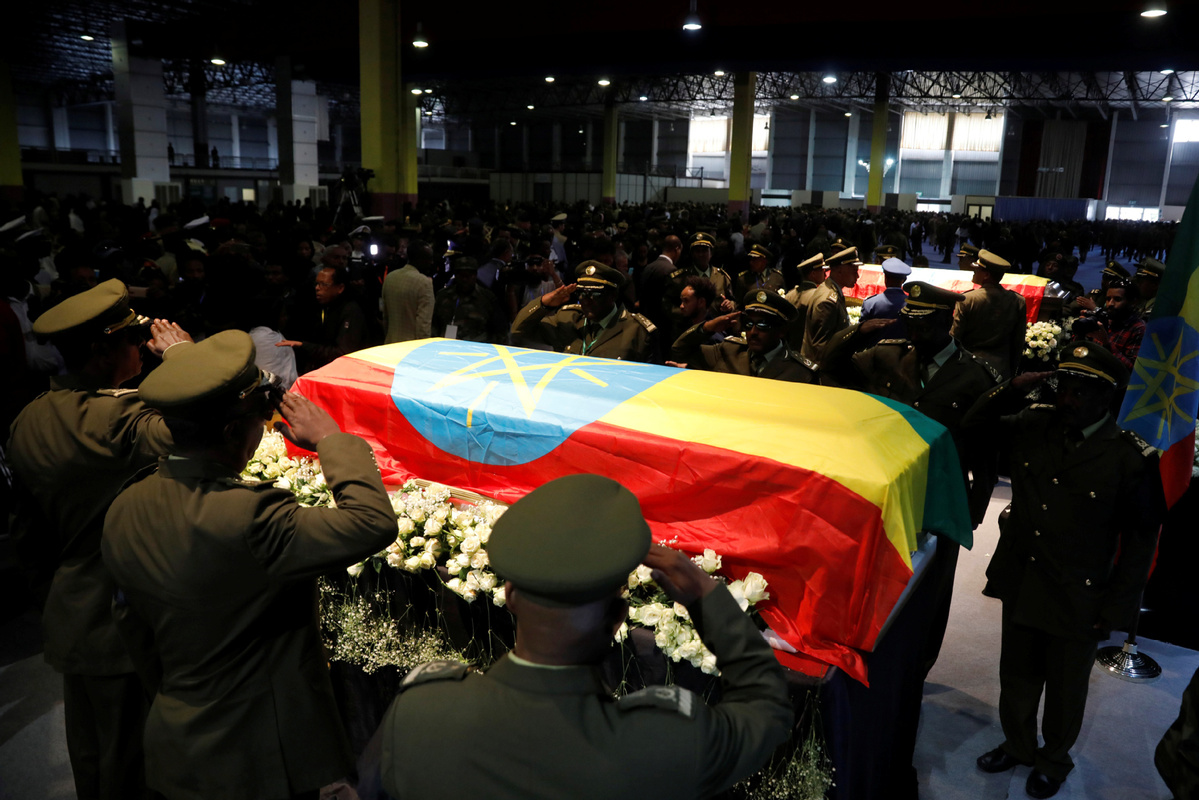Ethiopia stabilizes as attempted coup dents reform progress
By Lucie Morangi in Nairobi, Kenya | chinadaily.com.cn | Updated: 2019-06-25 21:22

Ethiopia was engulfed in mourning and a state funeral held on Wednesday for a top official who was assassinated at his home over the weekend by his bodyguard. The government linked the death of Seare Mekonnen to the attempted coup in the northern state of Amhara, on Saturday.
Addis Ababa, the capital city of Ethiopia, remained relatively calm on Tuesday even as the key suspect behind the coup attempt was captured and shot dead by police on Monday, state media reported.
Brigadier General Asaminew Tsige, who had been serving as the regional government's peace and security bureau head, was accused of being behind attacks on Saturday that killed five people, including the national army's chief of staff.
He was reportedly shot near Amhara's capital, Bahir Dar, a BBC report said.
Yonas Adaye, an assistant professor and associate academic director at the Institute for Peace and Security Studies at Addis Ababa University said that despite the general situation of the country remaining stable, the instability, limited to the northern regional state, might be an indication of existing ethnic tension.
Nevertheless, it was a wakeup call to Prime Minister Abiy Ahmed's relatively young administration to fast track its reform agenda that has brought sweeping changes to the previously autocratic state. The 42-year-old Abiy took office last year in April after crippling protests forced his predecessor to step down.
Since taking over leadership, his administration has tried to distance itself from previous regimes. Abiy has released tens of thousands of political prisoners in a bid to end political repression, offered an olive branch to previously banned opposition political groups and oversaw the prosecution of officials accused of human right abuses.
In addition, he has given more freedom to the media and has been instrumental to regional peace and stability initiatives.
But these democratic changes are yet to be positively embraced domestically. Adaye opined that long-held apprehension still existed in the country and recent incidents are an indication that the government needed to fast track its efforts to unite the country. A year ago, Abiy survived a grenade attack at a rally.
The reforms are an attempt to move the country from an authoritarian to democratic rule and the turbulences are teething problems, the scholar said. There is a deficit of democratic culture in the country, and tolerance is new. "Any effort by the government, whether good or bad, is met by resistance. So anything can trigger instability," Adaye said.
While he noted that the latest incidence may dent the government's efforts, it would also nudge Abiy to expedite decision-making processes to bring tangible change to the people. The administration may also change its tack since ongoing efforts may not be addressing the immediate needs of the people.
He noted that the recent incident in Amhara was a continuation of ethnic extremism in the region and may be an indication of simmering views in other parts of the country as well.
It is alleged that the regional president, his aide and the region's attorney general were attacked during a meeting to discuss Tsige's ethnic rhetoric and recruitment of militias in Amhara, according to a report by The Guardian.
The chief of staff, Gen Seare Mekonnen, was later killed at his home while trying to foil the coup, said the government, which termed it as a coordinated attack.
To enhance peace and stability in the country and continue on its transformational path, Abiy's administration would need to enhance law and order. This may mean restructuring the regional administration. Adaye asserted that the coup attempt was a test of the reality on the ground.
Secondly, the government should continue to be accountable and strengthen engagement with the public through the media, to buy in support from the people.
"Getting to the root-cause of ethnic tension in the country should also be prioritized. This will be through a constitutional change, since the situation dates back 27 years ago," Adaye said.
Meanwhile, Adaye said he believes that Ethiopia will continue with its regional position as a mediator and promoter of peace and stability. Abiy struck a peace agreement with Eritrea in August last year, which had been deemed elusive for a long time. Recently, he was in Khartoum and proposed a civilian-majority governing council as the avenue towards political transition.
























